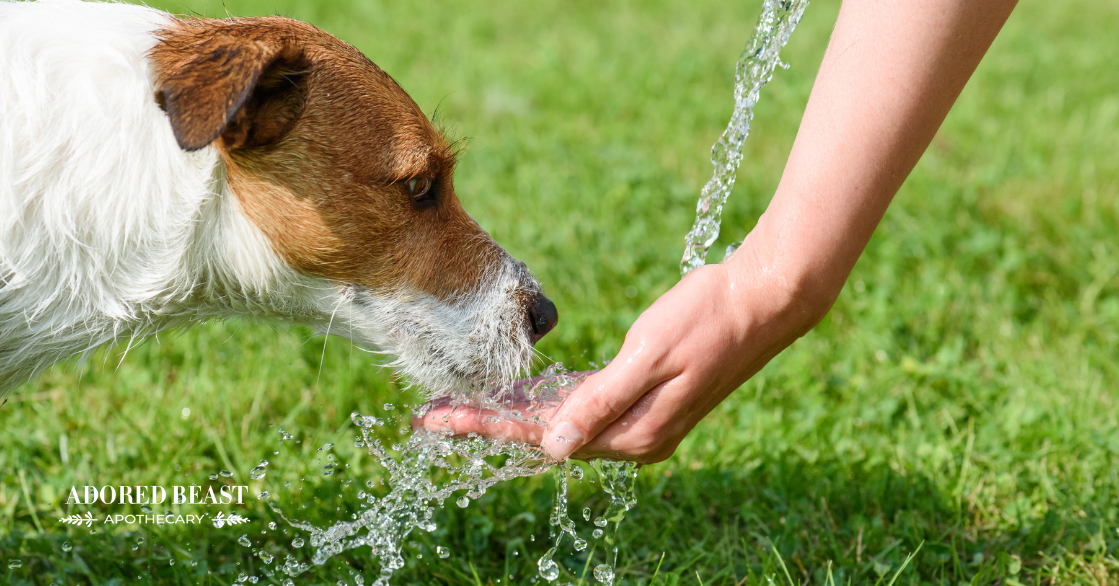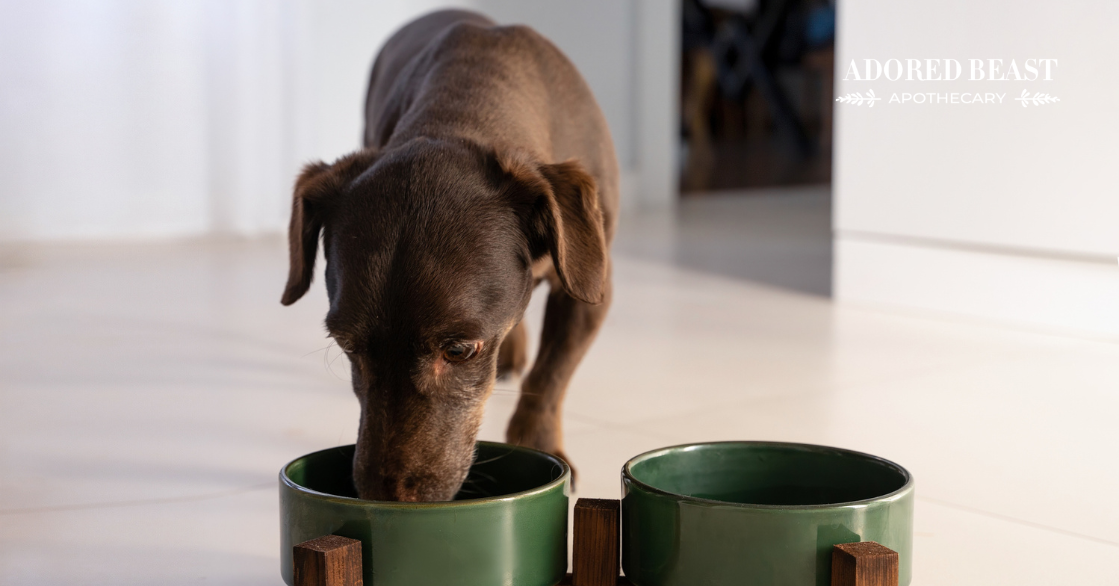How often do you fill your dog’s water bowl? Once a day? Twice a day? Every hour?
Do you actually pay much attention to it?
In our house, we have 3 large, raw fed dogs. They share water bowls, and we just keep an eye on them and refill them whenever they’re empty. But I don’t think I could tell you how often that is…
But it’s an important question. Our pups need water to thrive and stay healthy. Water is necessary for almost every important function in the body: lubricating the joints, cushioning internal organs, aiding digestion, and regulating body temperature.
So, how much water should a dog drink per day? And how can you help encourage water consumption (or when is too much water a concern)?
How Much Water Should a Dog Drink Per Day?
Of course this depends. There’s no one size-fits-all-approach.
That said, there are general guidelines.
On average, a healthy dog should drink between ½ and 1 ounce of water per pound of body weight every day. That means a healthy 50lb dog should be drinking about 25-50 ounces, or about 3-7 cups per day.
Now, that’s just a baseline number. And several factors may influence it.
For example, raw fed dogs tend to drink less water per day because raw food has a much higher moisture content than kibble. Some pet parents also add water to dry food, for a variety of reasons, which means they may not necessarily be “drinking” it, but they are consuming it.
Additionally, keep weather in mind. On a hot day, your dog will naturally want to drink more water to help keep themselves hydrated. The same goes for activity level. After strenuous activity, or even just a walk, they’ll typically drink more water.
***Puppies usually need more water than adults, and may need more careful monitoring of water intake. Don’t restrict their access to water, and make sure they take breaks during play to drink.
So how much water should a dog drink per day? As you can see, that will depend on a variety of factors. And that said, there are things you can look for to make sure water consumption is at an optimal level…
[RELATED] Don’t forget to wash those bowls (Here’s why, how often, and how).
Too Little or Too Much?
Especially during the summer months (or every month, depending on where you live), dehydration can be an issue. It’s important to ensure that A) Your dog always has access to fresh, clean water, and B) that they’re actually drinking enough of it!
Dehydration in dogs can be fatal if not addressed, so you need to be able to spot the signs. Here’s what to watch out for:
- Pacing, listlessness
- Excessive drooling
- Looking for water
- Pale, dry, or sticky gums
- Loss of appetite
- Excessvie panting
You can also do the scruff test. Gently take your dog’s scruff (the loose skin over their shoulders) and lift it away from their back. If your dog is well hydrated, the skin will bounce back right away. However, if it takes a while for it to settle back down, they could be dehydrated.
Dehydration is one thing – and may just be a one off due to a hot day or not drinking enough water during a strenuous activity. Or, it could come as a result of an underlying health concern.
If your dog is not drinking enough water, these could be other reasons:
- pancreatitis
- parvovirus
- leptospirosis
- arthritis/hip dysplasia/spinal degeneration/cardiomyopathy/injuries (If the hips or joints hurt, it could be painful for your dog to get down to the level of the water bowl. Raise those bowls up to make access easy and comfortable.)
Too Much?
On the flip side, if your dog tends to gulp, gulp, gulp, all day long, this over-consumption could also signify an underlying health issue. With regard to how much water should a dog drink per day, drinking too much water can be just as indicative of a problem as drinking too little (sometimes even more).
If your dog is drinking too much water, these could be the cause:
- diabetes
- liver or kidney disease
- Cushing’s disease
- bladder infection
- cancer
- and more
If your dog’s water intake is a concern, speak to your veterinarian. And please, don’t restrict access to water. For example, if your dog is drinking a lot of water at night, before bed, please don’t take the water away for the night. Instead, make sure you discuss this increased water intake with your veterinarian. Once you have results back, if there is something wrong, we always recommend working with an integrative or holistic veterinarian.
How to Make Sure Your Dog’s Drinking Enough Water
There are several ways to help make sure your dog is drinking enough water.
- Make sure water bowls are filled with fresh, clean water
- Add water to food
- Place additional water bowls outside and encourage water breaks during playtime (just don’t forget to wash them and refill them regularly)
- Watch for signs of dehydration
- Bring water with you for your pet whenever you leave the house, and a collapsable bowl or container they can comfortably drink from
- Look into a water fountain – many pets like the interaction of playing with the water, especially cats
- If you have an elderly, injured, or arthritic animal, please make sure the water bowl is raised
How much water should a dog drink per day? As you can see, that depends. But general amounts are a good start. Today, keep an eye on how much your pet drinks. Keep track of how often you fill that water bowl, and with how much. Knowing how much your dog typically drinks can be a really good way of paying attention and getting ahead of disease. And when you can get ahead of a major disease, you’re much better off. Water intake is a huge marker for how healthy your animal is, so it always makes sense to watch.












